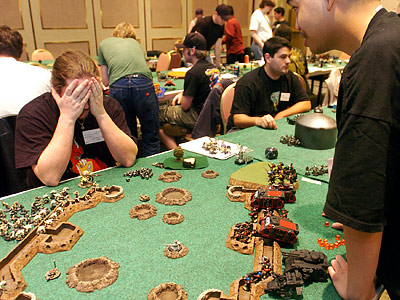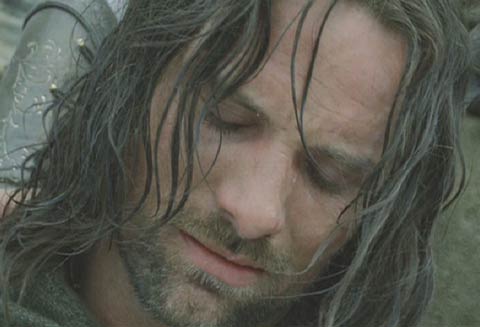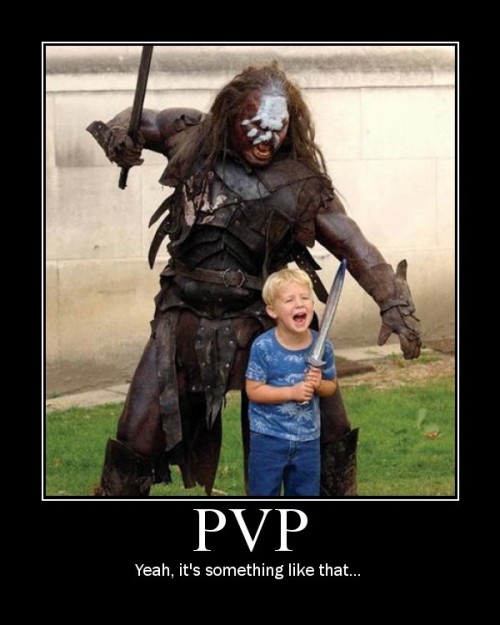I'm not really sure why this topic came to my mind. I mean, it's not an original opinion or anything groundbreaking. Plenty of people don't like D&D 4th Edition for very astute reasons that have been carefully laid out and explored ever since it came into existence. In fact, I could likely link you to a variety of articles and videos telling you precisely why 4th Edition sucks.
But I won't.
'Cause I gotta throw my two cents in while 4th Edition is the current figurehead of the biggest role-playing game in existence.
It's no surprise really that I don't like this system. Hell, I don't even like Dungeons and Dragons. Shocker, right? While I do enjoy fantasy to an extent, it is by no means my favorite genre, and D&D has always been too technical, grindy, and bloated with things that usually don't fit into my settings or don't interest me all that much. Still, it's what the masses want, so despite my better judgement and opinions, I have to run it and play it to either keep my friends happy or give non-gamers something they've heard of to break them into the hobby.
That being said, I will admit that 4th Edition isn't a horrible way to get non-gamers into the hobby. It's simple enough, identifiable, teaches the basics of the hobby, and you can have a good time with it. Believe me, I have. In those ways, it succeeds in being a game that can be played and enjoyed, so it's not complete and utter garbage.
Unless you have an inkling of design and role-playing game sensibilities. Then it's complete and utter garbage.
Let's break down the reasons, shall we?
Reason 1: The Three Tiers
God, is this stupid. So, the game tells you straight out how your character's career is going to go based on levels. 1-10 is the Heroic stage, where you do what is typically expected in a fantasy game. 11-20 is the Paragon stage where, after the passage of one level, you are a major player deciding the fate of the world or nation, flying on hippogriffs or teleporting, fighting bigger and deadlier monsters. 21 and on is the Epic tier, going across nations in an instant, fighting in the air, deciding the fate of the multiverse.
But, hold on. So, if I want a game completely based on heroes that are usually presented in something akin to Lord of the Rings, Mistborn, or other fantasy realms I like, I'm limited to level 10? If my players go beyond that, they are suddenly breaking into stuff that may not even be in my setting? Why are my players or myself constrained to this career path? Sure, you can ignore the fluff, but the game won't. And it will take a lot of editing to scale down some of the powers and abilities you can get down the line.
Thanks for assuming I'm going to be playing by your setting expectations, D&D. Don't label yourself as a fantasy system for all flavors if you're gonna pigeonhole me to the dungeon crawl, shake the nations with power template.
Reason 2: Skill Challenges
If you've been following this blog in any capacity, you know that my favorite part of RPG is the 'RP'. I'm usually not a big fan of the game part. I prefer role-playing, creating characters, getting into character, interacting, talking, going through a character arc, emotion, all that fuzzy stuff.
Here's a middle finger to all of that.
4th Edition introduced the idea of skill challenges, something I swiftly threw out, and the players I ran the game for probably forget that they exist. Basically, it's a complicated series of skill checks meant to represent some kind of encounter that isn't combat. So, the game designers sat down and said, "Okay, combat is all statted out to the last letter. Players might get bored if they're doing something not in a dungeon that has something to do with a thing called story, like convincing a king to go to war or exposing a liar, so we'll make it like a combat encounter! They'll roll a lot of dice and stuff! Can't have anything fun happening without the rolling of dice!"
So, an important role-playing encounter is now just another series of rolls, hardly influenced by the player's wit, charm, or ability to talk through situations. While this may help a player who is socially awkward play a suave diplomat because he's trained in diplomacy on his sheet, it cheapens an important part of the tabletop RP experience into something trivial and almost unnecessary. I could see an encounter like this go with just rolling dice with no explanation, and the whole thing is blanketed over and resolved in time to get to the next combat encounter.
Again, if you like that sort of thing, that's fine! Still, though, you are potentially cutting out a part of the game that is important to weird people like me who'd prefer to spend two hours sitting around a campfire and swapping stories than slay an army of orcs.
Reason 3: Classes and the 'Powers' System
I saved the best for last.
Picture that room of genius game designers again. "Alright, so, in our last edition of the game, people who played fighters and rangers and stuff were bored because all they did was hit things while the magic users got to pick spells and think. So, here's my idea, now everybody gets to choose things like spells!"
"What about the fighters and rogues who don't use magic?" asks someone who's paying attention.
"Ah, but they won't be called spells! They'll be called powers! Fighters can do special moves that attack stuff in neat ways and rogues will be all special sneak attack, flourish, and stuff!"
"So, what's the difference between a wizard's fireball spell that does a d8 of damage versus a fighter's special attack that does a d8 of damage?" asks the same guy who's paying attention.
"Uh, nothing, when you get right down to it."
"And aren't special moves and ways to improve normal combat what feats are for?" asks another person who just woke up.
"Screw feats!"
And there you have it, folks. Now, wizards and sorcerers are like everyone else. Their powers are pretty much equivalent to the special moves of their more mundane counterparts. No more studying up spells. They just go off, like magic! Sure, maybe this class can heal, or this class has a plus two to something that no one really cares about, but all of the classes are able to do cool things, all the time!
I think Syndrome said it best.
(Sorry for the bad quality~)
This becomes painfully obvious when you look at the way they handle multi-classing in this edition. Basically, you pick up the multi-class feat, pick another class, and you get one of their special things that no one cares about and an extra power. And that's it.
And, obviously, feats get the shaft too. No more careful optimizing, you power gamers who love this system so much! Feats give you little bonuses to things you don't care about, and there's a lot less of them of you're just working off the original three core books.
This is garbage on so many levels, it's not even funny. What was supposed to make combat more interesting and fun becomes mundane incredibly fast. Hell, there's not even a point with just attacking with your weapon anymore. Just do your At-Will, over, and over, and over.
Doesn't matter what class you pick. Scramble the ability scores a little, pick a race, grab a class out of the bag and you're set to go. Oh, but aren't there RP implications of being a wizard versus a fighter? Nah, D&D doesn't care anymore. That's why they added Skill Challenges. So, go ahead, whether you're shooting magic missile or stabbing a dude in the back, roll those pretty little dice, do some damage, crawl a little further into the dungeon, advance down our preset career path carefully laid out for you. Have you tried our Neverwinter setting, perfectly optimized for that carefully laid out career path? Well, you should! 'Cause creativity is for losers.
Rant Over
God.
That felt good to get off my chest.
Anyway, whether you agree with me or not, I hope you enjoyed my slightly bothered ranting. If not, here's a funny picture.
-Wes





Well said!
ReplyDelete